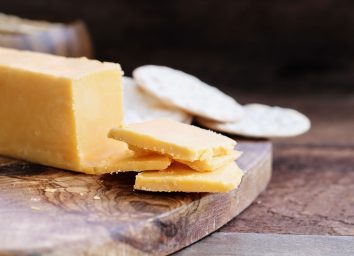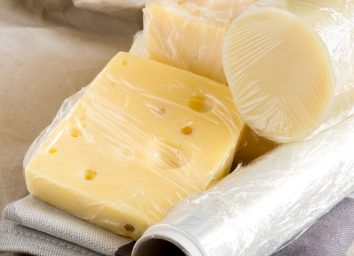12 Side Effects of Eating Too Much Cheese, According to Dietitians

Whether you’re at your favorite burger joint, a cocktail party, or are just looking for a bold and flavorful snack, it’s difficult to ignore the delicious allure of cheese. With so many varieties of cheese out there, this versatile, tasty food is bound to complement and elevate any dish, from pizza to tacos and even a sophisticated charcuterie platter. At the same time, eating cheese can trigger a handful of side effects that can impact your body and health, especially when not consumed in moderation. But why does this occur, and what exactly does happen to your body when you eat too much cheese?
“These effects can be triggered by factors such as the high-fat content of cheese, the hormonal composition of dairy products, the potential inflammatory response to saturated fats, and the risk of bacterial contamination in certain cheese varieties,” Mary Sabat MS, RDN, LD, tells Eat This, Not That! “It’s important to maintain a balanced and varied diet to mitigate these risks and promote overall health and well-being.”
To learn more about which possible side effects could potentially arise after eating too much cheese, we spoke to a handful of nutrition experts. Read on, and for more, don’t miss 11 Cheese Brands That Use the Highest Quality Ingredients.
You could become constipated.
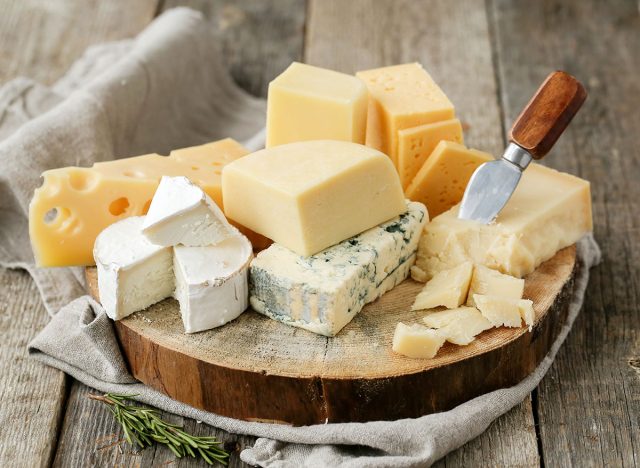
“Eating excessive amounts of cheese can potentially lead to constipation,” says Sabat. “Cheese is high in fat and low in fiber, which can slow down digestion and make it harder for the stool to pass through the intestines. This can result in infrequent bowel movements and difficulty in eliminating waste.”
“In the short term, consuming large quantities of cheese can cause immediate discomfort and bloating, while long-term overconsumption may lead to chronic constipation,” explains Sabat.
You could experience inflammation.

“Consuming casein, a protein found in milk and a major component of cheese, can potentially lead to various side effects and health issues. One significant side effect related to casein consumption is inflammation,” says Sabat. “In some individuals, casein can trigger an immune response and contribute to inflammation in the body. This inflammatory response can manifest as a wide range of symptoms, including digestive problems, skin issues, respiratory discomfort, and even joint pain. For individuals who have a true allergy or sensitivity to casein, the immune system recognizes casein as a threat and releases inflammatory mediators, leading to adverse reactions,” she elaborates.
You could get heartburn.

“Cheese is a rich source of fat and can trigger heartburn in susceptible individuals,” says Sabat. “When consumed in excess, the high-fat content of cheese can relax the lower esophageal sphincter (LES), a muscle that normally prevents stomach acid from flowing back into the esophagus. This can result in a burning sensation in the chest and throat,” she explains. “Over time, chronic heartburn can damage the esophageal lining and lead to more serious conditions such as gastroesophageal reflux disease (GERD).”
Your skin may experience breakouts.

“Acne is a multifaceted topic as it is affected by a variety of factors including diet quality, hormones, age, genetics, hygiene practices, cosmetics, and the environment,” explains Toby Amidor, MS, RD, CDN, FAND, an award-winning nutrition expert and Wall Street Journal bestselling author of The Family Immunity Cookbook.“According to the clinical guidelines published by the American Academy of Dermatology (AAD) when it comes to diet, emerging evidence suggests that high glycemic index foods and dietary patterns may be linked to acne.”
“While not everyone is affected, some individuals may experience skin breakouts or worsened acne as a result of consuming excessive amounts of cheese,” adds Sabat. “This could be attributed to the hormones present in milk, including insulin-like growth factor 1 (IGF-1), which can stimulate sebum production and contribute to clogged pores. Additionally, cheese is high in saturated fats, which may promote inflammation in the body and potentially aggravate existing skin conditions,” she explains.
“When it comes to dairy foods, there is limited evidence to suggest that milk/cheese may influence acne, but the AAD guidelines state that the quality and strength of evidence is limited and inconsistent,” Amidor continues. “As such, the AAD concluded that at this time there are no specific dietary changes recommended for the management of acne.”
Your risk of contracting listeria could increase.

“Listeria monocytogenes is a bacterium that can cause foodborne illness, particularly in individuals with weakened immune systems, pregnant women, and the elderly,” says Sabat. “Soft cheeses, such as brie, camembert, and blue cheese, have a higher risk of contamination with listeria. If these cheeses are consumed excessively or not stored properly, the risk of exposure to Listeria may increase.”
“Listeriosis can lead to flu-like symptoms, severe complications in vulnerable individuals, and even miscarriage or stillbirth in pregnant women,” she adds.
Your cancer risk could increase.
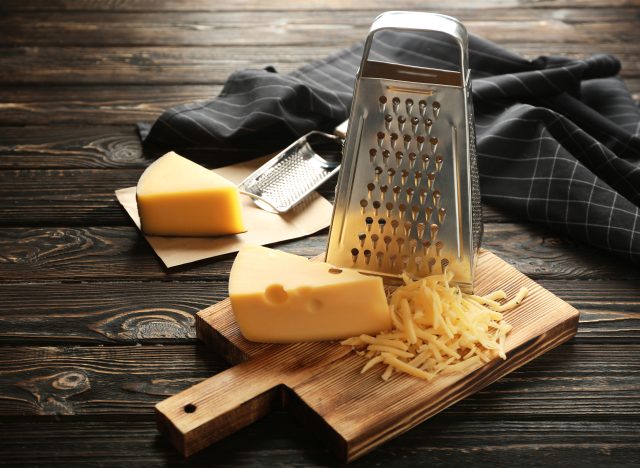
“Overconsumption of cheese, particularly high-fat varieties, may potentially increase the risk of certain cancers,” says Sabat. “Cheese contains saturated fats, which have been associated with an increased risk of colorectal cancer. Moreover, some studies suggest a correlation between the consumption of dairy products, including cheese, and an elevated risk of prostate and breast cancers,” she adds. “However, it’s important to note that the link between cheese consumption and cancer is still being researched, and other factors in one’s diet and lifestyle also play a significant role.”
You end up bloated.
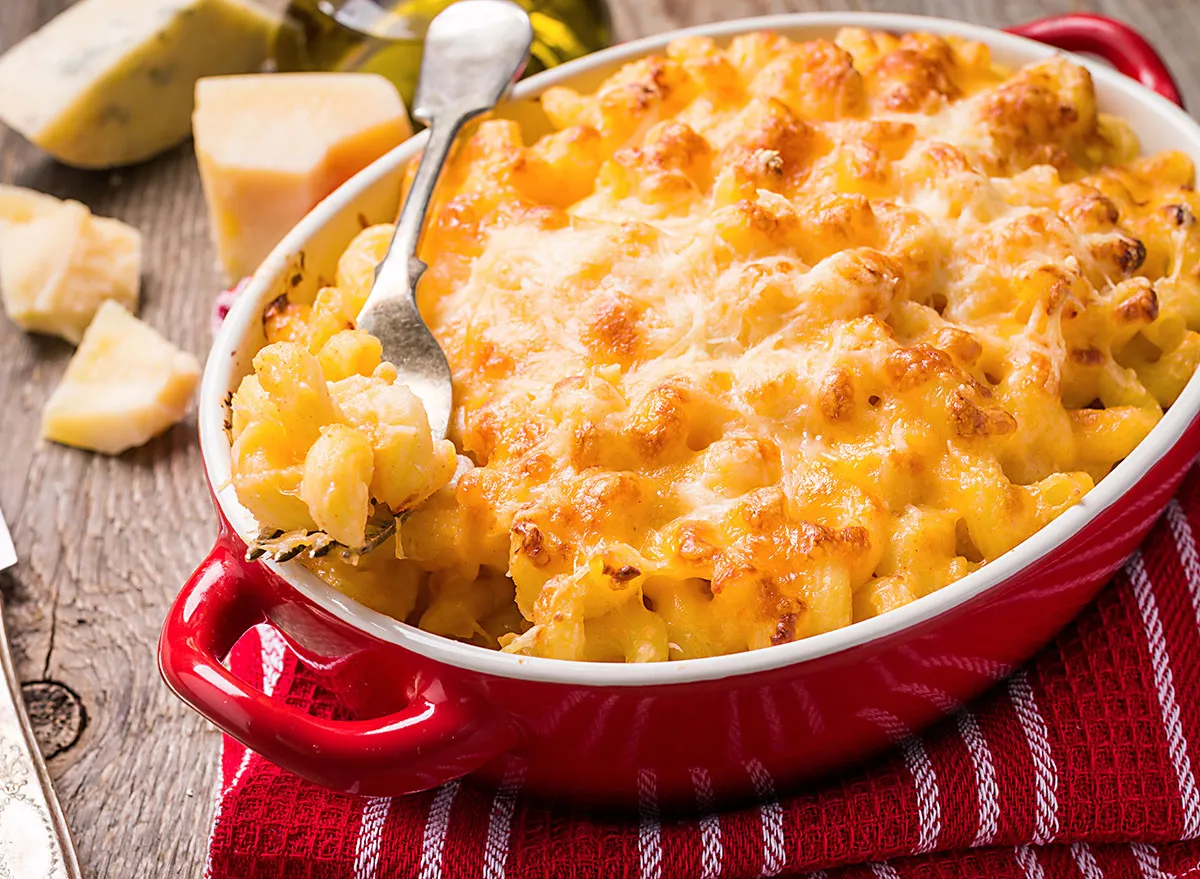
If you chow down on mac and cheese only to find yourself full of uncomfortable regret soon after, you can probably blame all the cheddar, swiss, and gouda in your bubbly pasta bake.
People who struggle to digest dairy (or who, you know, eat gobs of it on the regular) are likely to wind up pretty bloated within 30 minutes to two hours, says Amy Gorin, MS, RDN, a plant-based registered dietitian and owner of Plant-Based Eats in Stamford, CT.
Obviously, cutting back on your overall cheese consumption can help, but if you’re still experiencing a lot of bloating after eating even small amounts of cheese, you can try mixing up your varieties: Gorin says muenster, brie, and camembert have less lactose than some of their other cheese counterparts, so they may be easier to digest and cause fewer side effects.
Gorin adds that if you’re super lactose intolerant and eat too much cheese, all that lactose will move into your colon instead of being processed and absorbed within the body. “In the colon, the undigested lactose combines with the normal bacteria [and] causes gas,” she explains.
Per the FDA, experiencing gas soon after eating dairy products like cheese is one of the most common telltale signs of having insufficient lactase, which is the enzyme that breaks down the lactose, or sugar, in dairy products.
You get diarrhea.
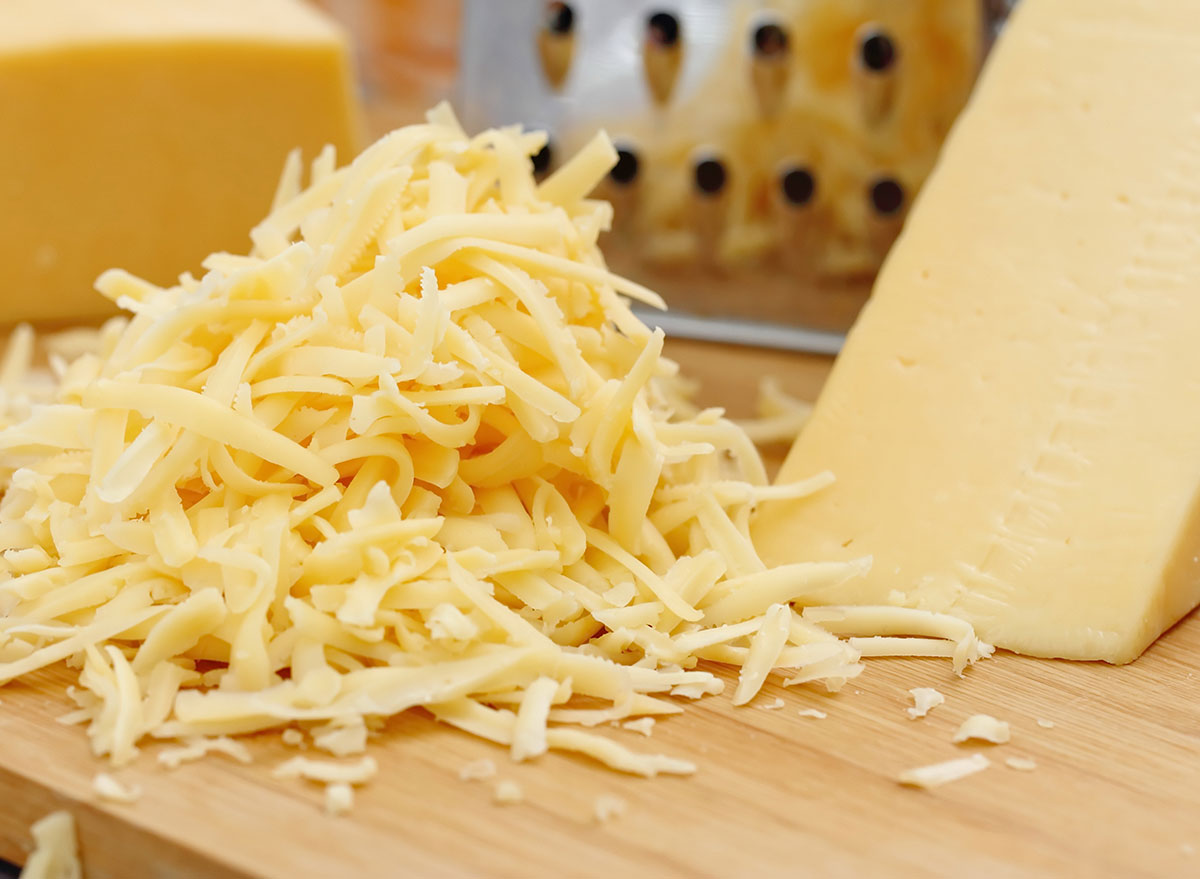
If you’re one of the many unlucky adults with a limited ability to digest lactose—a number that registered dietitian Sarah Rueven, MS, CDN, founder of Rooted Wellness says is about 65%—then overconsumption of dairy products can cause serious discomfort.
“When someone with a lactose intolerance consumes cheese, the lactase in the cheese isn’t broken down and is instead fermented in the gut by bacteria,” explains Rueven, who says this can result in diarrhea…among several other unpleasant GI symptoms.
You could become dehydrated.
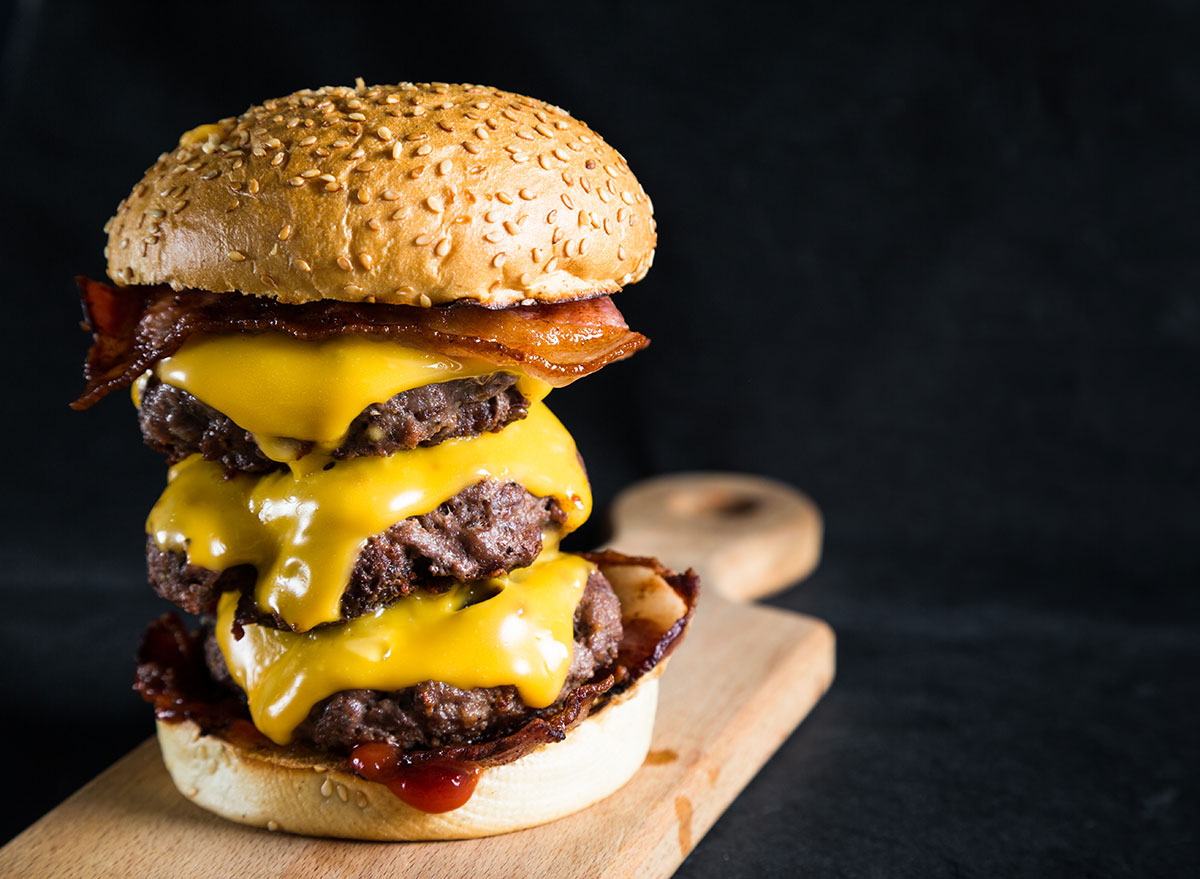
Yes, not drinking enough water can easily lead to dehydration, but so can eating foods high in sodium, like creamy casseroles and double-decker cheeseburgers.
“Cheese is a food that’s higher in sodium,” says Gorin, “[and] this can add up quickly, especially if you eat more than one slice at a time.”
Signs that your eating habits are making you dehydrated include headache and decreased urination, so make sure you’re intentionally hydrating before or after sodium-rich meals to avoid drying out.
Your water weight may increase.
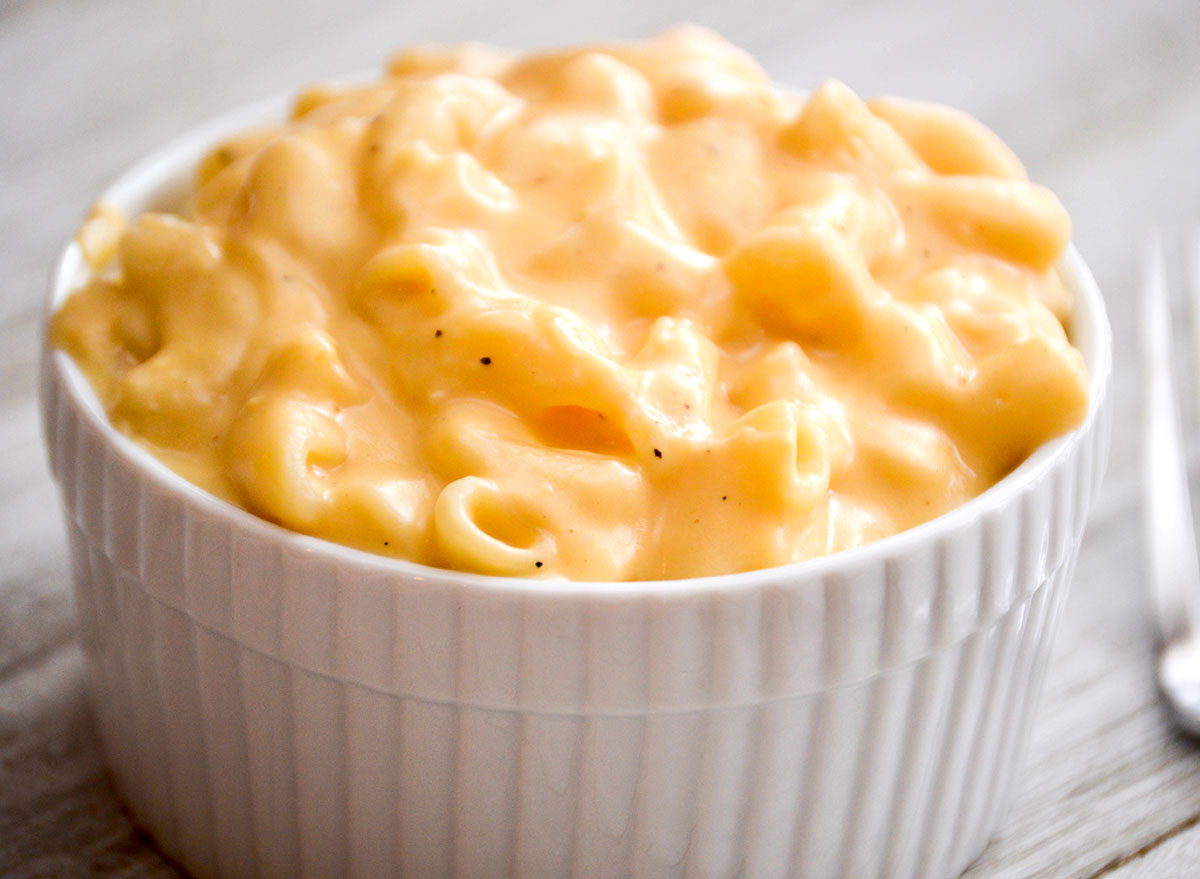
On the flip side, because cheese is high in sodium, Amy Shapiro, MS, RD, CDN registered dietitian and founder of Real Nutrition, says it can also cause people who are salt-sensitive to retain water. That’s why individuals on low-sodium diets, like those with heart disease or high cholesterol, are often told to limit or avoid cheese.
Your heart health suffers.
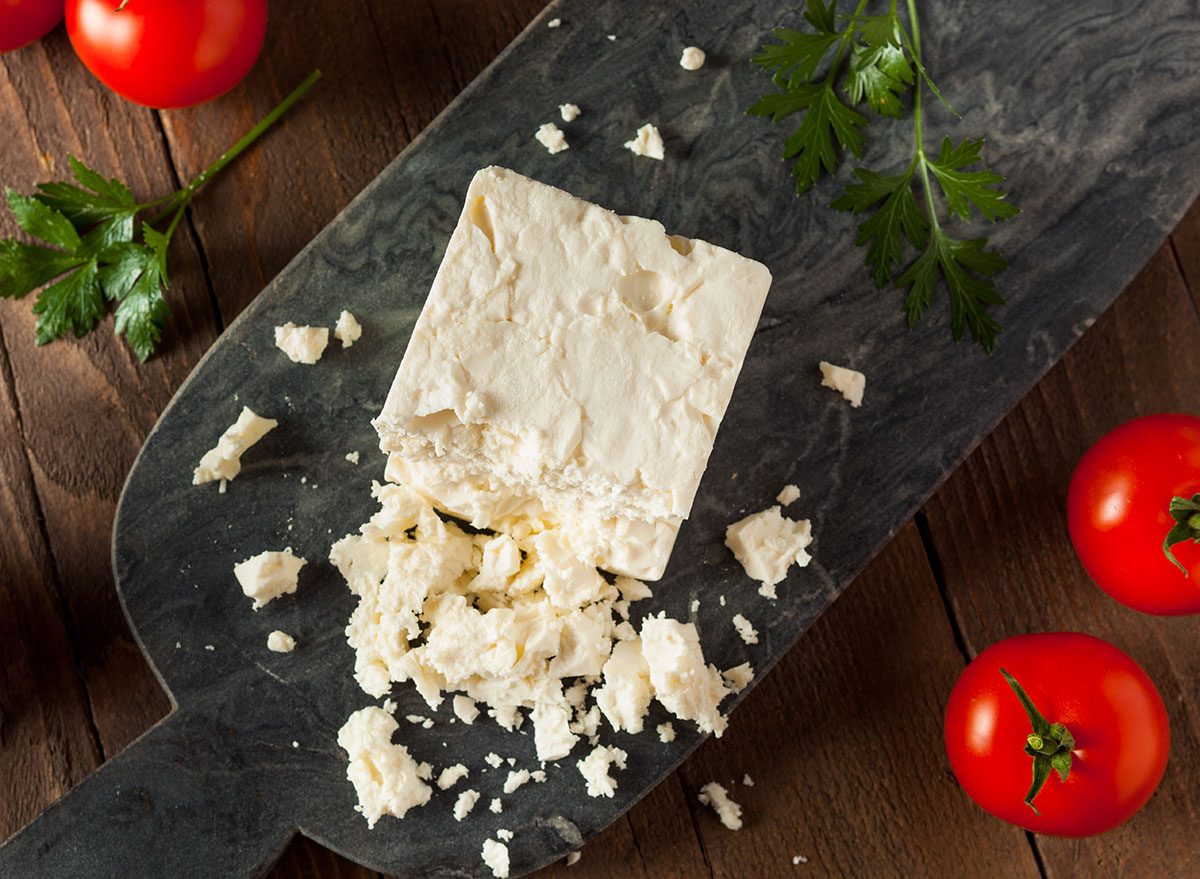
Eating too much cheese can set you up for a greater risk of heart disease, says Rueven, since the high sodium levels raise your blood pressure (hello, increased stroke risk) and the saturated fat elevates your bad cholesterol.
Need a quick refresher on saturated fat? According to Shapiro, it’s the type of fat that remains solid at room temperature and therefore, can clog your arteries.
“Saturated fat increases our bad cholesterol levels and, when consumed too often, can become unhealthy,” she says.
The good news, though? You don’t have to cut out cheese completely to avoid these side effects, emphasizes Rueven: “Eating cheese in moderation is not going to drastically elevate cholesterol and blood pressure, so enjoy it on occasion or use it in small amounts to garnish a salad or soup.” You can also try 10 Low-Fat Cheeses You Can Eat When You’re Losing Weight.
You might gain weight.

So here’s where some common misconceptions about cheese really work against us.
“Because people tend to think of cheese as a ‘low-carb’ food or one high in protein, they add it to many menu items like salads, sandwiches, and omelets, and enjoy it for snacks,” says Shapiro.
The problem? One ounce of cheese contains about 100 calories and eight grams of fat, she adds, so it’s not the “healthy” food many people see it as—instead, it pretty quickly increases your overall fat and calorie intake.
Over time, your cheese habits can lead to weight gain.
“Cheese is high in fat and fat is the most calorically dense macronutrient, meaning it provides more calories per gram,” says Rueven. “Consuming any food in excess, especially those high in fat like cheese, can cause weight gain if your overall calorie intake exceeds your daily requirements.” If weight loss is your main goal, don’t miss these Simple Ways to Start Losing Weight Immediately, According to Science.
A previous version of this story was published on February 24, 2021. It has been updated to include additional copy and proofreading revisions, additional research, and updated contextual links.

